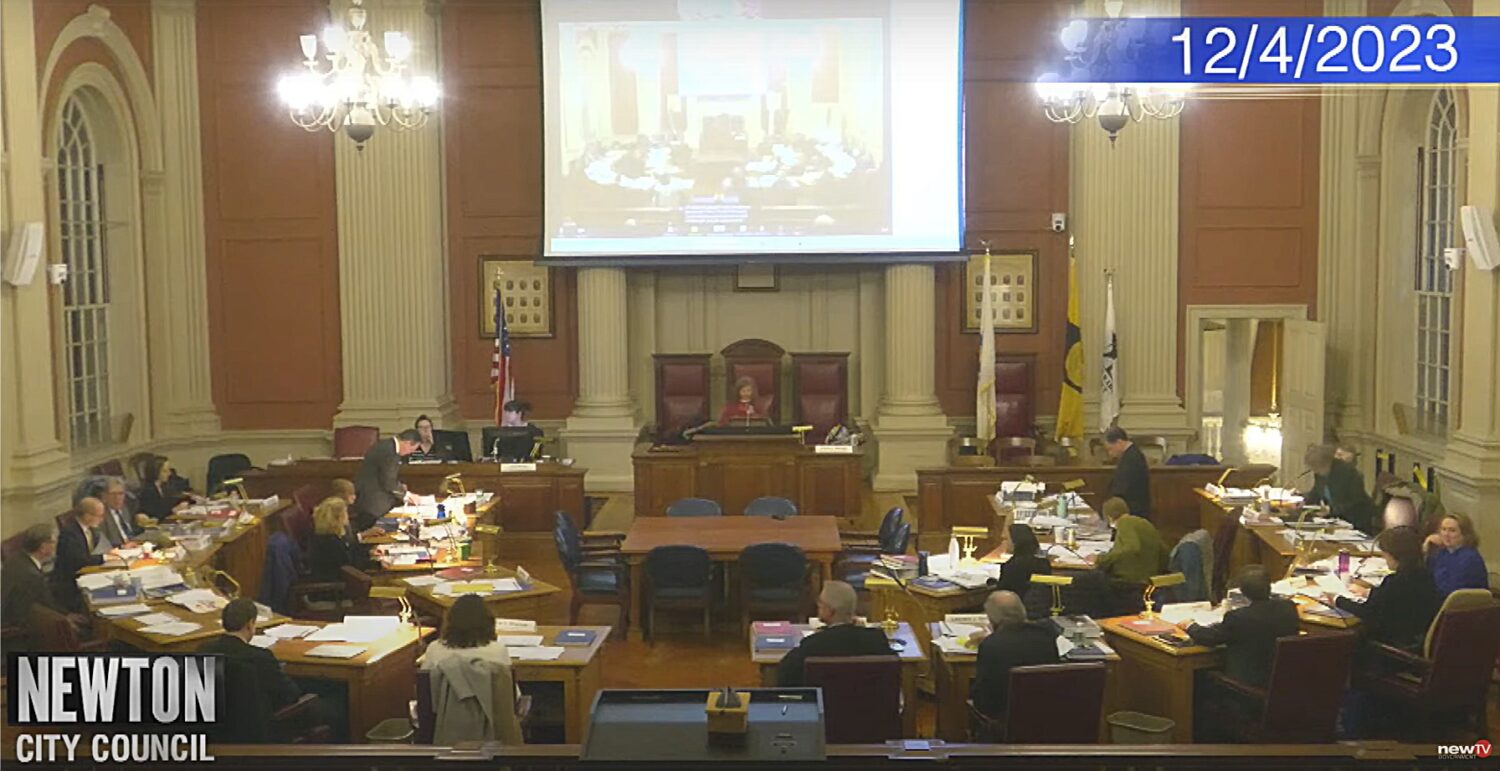After months of heated debate, the City Council voted on December 4 to approve a zoning package designed to comply with the MBTA Communities Law before the December 31, 2023 deadline. That law, as applied to Newton, requires zoning that allows “by right” development of multi-family housing within a half-mile of four of Newton’s Green line T-stops and three commuter rail stations. The final package contains parts of the proposed Village Center Overlay District (VCOD), which had been in development for three years by the Planning and Development Department and the Council’s Zoning and Planning Committee, led by Councilor Deb Crossley. This new ordinance will result in zoning for about 8,745 units of housing, or 415 more than the 8,330 units required by the MBTA Communities Law. The final vote was 21-2-1 (Leary, Noel opposed, Ryan absent). See video.
Before the November 7 election, a majority of City Councilors had favored a zoning plan incentivizing much more densely developed village centers. Following the election and a threatened referendum, City Councilors seemed more inclined to find a compromise that would at minimum comply with the MBTA Communities Law by the deadline.
Compromise Package of Amendments
After several long nights in contentious meetings over recent weeks hammering out amendments to the text and the maps initially approved by the Zoning and Planning Committee, Council President Susan Albright and Councilor Lenny Gentile worked over the weekend on a set of amendments for Monday’s meeting that would be acceptable to a broad majority of the Council. They identified areas of village centers previously designated for five- and six-story buildings that could be down-zoned to a maximum height of four stories. The City Council received the text and maps (see below) based on these proposed amendments on the day of the December 4 meeting, and that meeting began with several Councilors expressing a desire for compromise.
In the meeting, President Albright acknowledged the hard work of Councilor Gentile, who was not a proponent of the full VCOD plan and who had objected to including Auburndale in the final proposal. Auburndale is one of three Newton commuter rail stations slated for significant overhaul to make it ADA compliant and install a second track to allow trains to move through Newton in both directions at the same time. Some had expressed concern that omitting Auburndale from the zoning plan would jeopardize funding for that overhaul.
At the start of the discussion, Councilor Gentile withdrew his earlier amendments and offered amendments #10 through #14 as a package to be voted on together:
- Zone the following sections on the north side of Washington Street VC2:
- Washington Street from Elm Street to Cherry Street
- West side of Waltham Street to Washington Street
- Washington Street west to Corner Cleaners
- Zone the south side of Washington Street from Highland to Chestnut Street VC2
- Require 0.5 parking spaces per unit for every VC3 lot over 20,000 sq. ft.
- Zone whatever parcels that are currently proposed as VC3 or VC2 zones to all be VC2. Remove all MRT.
- To be eligible for the additional story bonus, the project shall be no less than 50% affordable.
At Monday night’s meeting, City Council Vice President Rick Lipof, a staunch supporter of the initial VCOD, moved to accept the amendments, seconded by Councilor Marc Laredo, who supported an MBTA-only zoning plan. A majority of the City Council agreed. Ward 4 At-Large Councilor Josh Krintzman, who originally supported the more densely zoned plans, said he believes the Zoning and Planning Committee crafted an ordinance that recognized the housing crisis and included good policy to build around transportation and village centers. Although he thought that the process and plan were really good, the election “made it clear that a lot of voters did not like the plan and thought it was too much and too fast.” He added that while he “heard that voters were misled and heard that others thought it was a good plan and should just move forward,” he assumed voters were “acting in an informed way and acting deliberately.” Since the compromise included Auburndale, he was going to support it.
Outgoing Ward 2 Councilor Emily Norton, who favored compliance with the MBTA requirement but not the VCOD, argued that the Council had gone over the planning process long enough and could vote on the proposal. She said that it was clear that no Council members were completely happy with the final version. As Ward 5 Councilor Bill Humphrey noted in supporting the reduced plan, “it is a reasonable deal,” and he applauded the bonus for allowing six stories if 50% of the resulting development would provide apartments at 50% of the city’s Annual Mean Income (AMI).
After some debate, the Council voted to accept Councilor Gentile’s package (22-1-1; Leary Opposed; Noel Absent).
Final Vote
When it came to the final vote, only two Councilors voted against the entire zoning proposal: Ward 1 At-Large Councilor Leary and retiring Ward 6 Councilor Brenda Noel. In explaining her reason to vote against adoption of the zoning, Leary said, “I understand the art of compromise, but what we’ve done has eviscerated work over the last 3 years.” She added that we have a climate and housing crisis, and the amendments passed have undercut so much that she believes very little will get built.” Councilor Noel said that at the end of the day, the state was the one who got this done. She referenced a report by Newton resident and Planning and Development Board member Amy Dain that said, “local municipalities, if left to their own devices, would not vote in a way that reflect our values,” and added that she experiences this as “a huge disappointment.”
Reactions to the Vote
After the vote, the Charles River Regional Chamber — a strong advocate for the VCOD proposal that originally came out of the Zoning and Planning committee — issued a statement saying in part:
“We would have liked Newton to have followed the lead of Lexington, Arlington, Brookline and other communities that rose to the challenge of confronting our region’s housing crisis by approving zoning plans that went beyond what the MBTA Communities Law required. But we still celebrate this achievement tonight.”
Chamber President Greg Reibman said that the Chamber was glad to see that Newton Centre, Newton Highlands, Waban, West Newton, Newtonville, and Auburndale are included and would benefit from the zoning, but the Chamber is disappointed that Nonantum, Newton Corner, Chestnut Hill, Upper Falls, Lower Falls and Thompsonville “won’t benefit from these upgrades.”
He added, “We do have some concerns that some of the reductions in building height and other changes to the original plan may eliminate some economic feasibility. …We’re also concerned that the state may not approve some elements of this since it has been scaled back and may ask the city to reopen the process in order to be in compliance. But overall, Newton will be a better, more welcoming and more economically vibrant city thanks to the hard work and advocacy of many.”
Newton for Everyone Coalition told Fig City News:
The Newton for Everyone Coalition congratulates the City Council for enacting zoning reform that complies with the MBTA Communities Act and includes Auburndale with nearly a unanimous vote. This is the most significant zoning update in decades, an important first step toward meeting Newton’s housing needs.
Updated zoning in six village centers will enhance Newton’s ability to provide housing opportunities that are more affordable for seniors looking to downsize, families just starting out, and people who serve our community.
These environmentally responsible reforms will build village vitality and support our businesses. They are the result of three years of public outreach, analysis, debate, and compromise.
There is still more to be done to bring housing opportunities and economic development to the additional six villages not included in the new zoning.
Newton for Everyone looks forward to continuing our efforts to create a broader range of residential options in Newton.
Save Newton Villages said, “We congratulate the leadership of councilors Albright and Gentile in presenting a compromise zoning package that the members successfully voted for tonight. The majority of the councilors were able to rise above their differences and come to a unified vote which was commendable.”
Right Size Newton said, “RSN is pleased that the zoning ordinance adopted by the City Council meets the MBTA Communities Act’s requirements, and we want to thank Councilors Gentile and Albright for arriving at a compromise package. However, we are very disappointed that a major loophole was left untouched. Although parcels of more than 30,000 square feet need to be approved by special permit, a developer can subdivide the parcel and build on those parcels by right. This loophole would allow thousands of units beyond the 8745 units that the Ordinance allows for. We are also disappointed that Newton Center remains almost entirely VC3. This will allow 5 story buildings with the top story stepped back by 10 feet. This is too high to maintain a village feeling.”
Engine 6 Newton Housing Advocates said, “This zoning sets new ground rules that will increase the opportunity to build more affordable homes – both deed-restricted affordable homes and market-rate homes that will cost less than the huge single family homes and townhouses of today. The new zoning starts to reverse decades-old land-use policies that have made Newton an increasingly expensive place to live, especially for seniors and young families.”
Vice President and Ward 7 Councilor Rick Lipof said, “Compromise often is born out of a process, and the work is done during the journey along the way. Other times it happens in the final hours which is what happened tonight. In the end I’m proud of what we got accomplished and I’m looking forward to this Councill coming together and working collaboratively on what is best for Newton.”
Ward 2 at-Large Councilor Tarik Lucas said, “I am happy Newton is going to comply with the landmark MBTA Communities Housing Act. This has been a long and arduous process by city staff and my colleagues. And I am satisfied that we were able to come to a mutual agreement on the zoning ordinance. I am looking forward to working on other complex issues that the City of Newton will face in the near future.”
[UPDATE: On December 28, Rep. Kay Khan wrote a letter to Council President Susan Albright, Council President-Elect Marc Laredo, and the rest of the City Council thanking the Council for its near unanimous vote and noting that including Auburndale in the zoning reform “will hopefully encourage the MBTA to consider the three stations in the Capital Investment Plan, making room for drastic improvements to the commuter rail stations that are currently underutilized and lacking in overall accessibility.”]
What’s Next?
The new zoning ordinance, which is subject to a 20-day appeal period, will be submitted to the State for approval before the December 31 deadline for complying with the MBTA Communities Law.
Ed. Note: We revised the second sentence of this article to make clear that the MBTA Communities Law requires zoning that allows development; it does not require development. We later updated this article to include Rep. Kay Khan’s letter of December 28.












